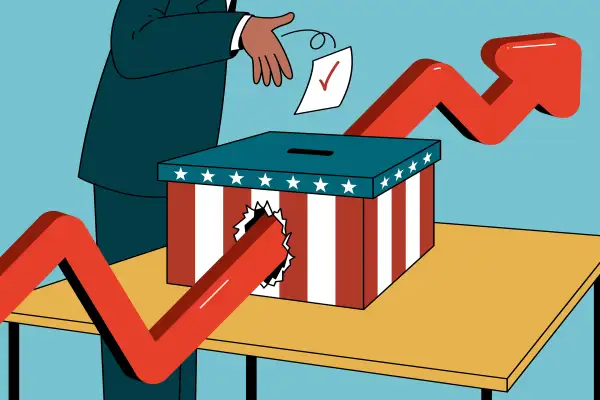The Stock Market Ultimately Doesn’t Care Who Wins the Midterms
Money is not a client of any investment adviser featured on this page. The information provided on this page is for educational purposes only and is not intended as investment advice. Money does not offer advisory services.

After much investor angst surrounding Tuesday’s midterm elections, stocks fell on Wednesday as the results — and control of Congress — remained unclear.
The S&P 500 index was down 1.7%, while the Dow Jones Industrial Average fell 1.6% and the Nasdaq Composite was down 2.2% as of midday Wednesday. Experts say those market doldrums may not last.
“The market likes certainty over uncertainty,” says Callie Cox, U.S. investment analyst at the brokerage firm eToro. In the short term, the midterms tend to be a “welcome shot of certainty for the market.”
That’s usually true no matter who wins the elections.
“Data shows that the market tends to perform well late in a midterm election year regardless of a blue wave, red wave, or a gridlock,” Gene Goldman, chief investment officer at Cetera Investment Management, told Money via email.
What election results mean for the markets
As of Wednesday morning, many experts are expecting a split result with Republicans gaining control of the House of Representatives and Democrats maintaining control of the Senate. Cox says that political gridlock could have a major impact on some sectors in the medium term — especially alternative energy, oil and gas. With control of Congress split, major legislation surrounding those hot-button issues and industries is less likely to pass, she says.
Markets are also contending with two factors Goldman says are more important than election results: the Federal Reserve's monetary policy and the threat of a corporate earnings recession (a significant slowdown in corporate profits that can happen with or without a broader economic recession).
Cox notes that a gridlocked government might be less able to pass legislation to alleviate the effects of a recession, and that outcome could have ripple effects throughout the market.
Midterm elections and investing strategy
If you’re investing for the long term, you can take comfort in the fact that experts say this week’s election results shouldn’t change your strategy.
“Whether it's Republicans, Democrats or a mixed-controlled Congress, we've tended to see markets move upward on average,” says Kevin Green, a senior researcher at Dimensional Fund Advisors.
The chart below from Dimensional will give you an idea of just how true that is. No matter which political party controlled Congress — or if control of Congress has been mixed — the stock market has steadily risen since 1926.
That growth happened despite daily, quarterly or even yearly fluctuations in the market.
“If you're a long term investor, you really need to zoom out,” Cox says. “It's probably smart not to mix politics with your portfolio.”
More from Money:
Stocks Usually Rise After Midterm Elections. Will That Happen This Time?
Why Stocks Are Bouncing Back Despite Fears a Recession Is Coming
The Fed May Slow Down Its Rate Hikes, But Investors Shouldn’t Celebrate Yet

